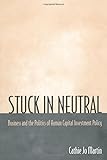Stuck in Neutral : Business and the Politics of Human Capital Investment Policy / Cathie Jo Martin.
Material type: TextSeries: Princeton Studies in American Politics: Historical, International, and Comparative Perspectives ; 72Publisher: Princeton, NJ : Princeton University Press, [1999]Copyright date: ©2000Edition: Core TextbookDescription: 1 online resource (264 p.) : 7 tablesContent type:
TextSeries: Princeton Studies in American Politics: Historical, International, and Comparative Perspectives ; 72Publisher: Princeton, NJ : Princeton University Press, [1999]Copyright date: ©2000Edition: Core TextbookDescription: 1 online resource (264 p.) : 7 tablesContent type: - 9780691009612
- 9781400823277
- 658.4/08 21
- online - DeGruyter
- Issued also in print.
| Item type | Current library | Call number | URL | Status | Notes | Barcode | |
|---|---|---|---|---|---|---|---|
 eBook
eBook
|
Biblioteca "Angelicum" Pont. Univ. S.Tommaso d'Aquino Nuvola online | online - DeGruyter (Browse shelf(Opens below)) | Online access | Not for loan (Accesso limitato) | Accesso per gli utenti autorizzati / Access for authorized users | (dgr)9781400823277 |
Browsing Biblioteca "Angelicum" Pont. Univ. S.Tommaso d'Aquino shelves, Shelving location: Nuvola online Close shelf browser (Hides shelf browser)
Frontmatter -- CONTENTS -- ACKNOWLEDGMENTS -- ABBREVIATIONS -- INTRODUCTION -- ONE. Business and the Politics of Human Capital Investment -- TWO. A Century of Business Involvement in Social Provision -- THREE. Nature or Nurture? Company Preferences for National Health Reform -- FOUR. On the Bus: Business Organization in Training and Work-Family Issues -- FIVE. The Least-Common-Denominator Business Community: Corporate Engagement with Health Policy -- SIX. United We Stand: Corporate Engagement with Training Policy -- SEVEN. An Affair to Remember: Small Business and the Republican Party against Family Leave -- EIGHT. Implications for Our Economic Future -- INDEX
restricted access online access with authorization star
http://purl.org/coar/access_right/c_16ec
According to conventional wisdom, big business wields enormous influence over America's political agenda and is responsible for the relatively limited scale of the country's social policies. In Stuck in Neutral, however, Cathie Jo Martin challenges that view, arguing that big business has limited involvement in social policy and in many instances desires broader social interventions. Combining hundreds of in-depth interviews with careful quantitative analysis, Martin shows that there is strong support among managers for government-sponsored training, health, work, and family initiatives to enhance workers' skills and productivity. This support does not translate into political action, surprisingly, because big firms are not organized to intervene effectively. Every large company has its own staff to deal with government affairs, but overarching organizations for the most part lobby ineffectively for the collective interests of big business in the social realm. By contrast, small firms, which cannot afford to lobby the government directly, rely on representative associations to speak for them. The unified voice of small business comes through much more clearly in policy circles than the diverse messages presented by individual corporations, ensuring that the small-business agenda of limited social policy prevails. A vivid portrayal of the interplay between business and politics, Stuck in Neutral offers a fresh take on some of the most controversial issues of our day. It is a must read for anyone interested in the past, present, and future of the American welfare state and political economy.
Issued also in print.
Mode of access: Internet via World Wide Web.
In English.
Description based on online resource; title from PDF title page (publisher's Web site, viewed 30. Aug 2021)









